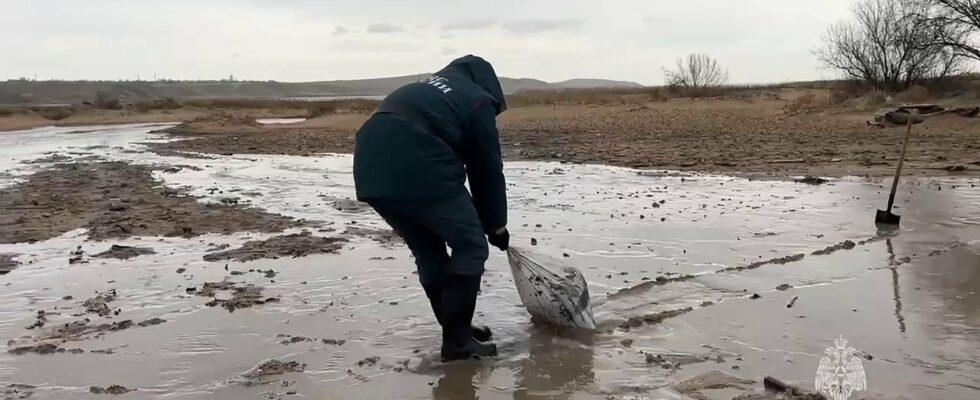An oil disaster with major ecological consequences. The Crimean peninsula, a Ukrainian region annexed by Russia since 2014, has experienced a major oil spill on its coasts in recent days. At issue: the successive sinkings of two Russian oil tankers in the Kerch Strait, a passage between the Black Sea and the Sea of Azov. These two ships were damaged after a strong storm passed through the region.
Patches of fuel oil are now accumulating on the Ukrainian coast and even reached, this Saturday, January 4, the large city of the region, Sevastopol. According to the Russian governor of the region, Mikhail Razvozhaev, some traces of oil were found on four beaches on the peninsula, but were “quickly eliminated” by local services. According to the Russian authorities, around 200,000 tonnes of soil could be affected by pollution linked to this fuel oil spill in recent weeks in the area. 86,000 tonnes of sand have already been cleaned on site, they specify.
Russian President Vladimir Putin himself spoke of the catastrophe, calling it an “ecological disaster.” Volunteers have joined the teams mobilized to try to clean up the coast, added the master of the Kremlin, engaged in a war for almost three years with kyiv. A conflict which also prevents cooperation between the two States on this issue, unlike the previous oil spill in the region, in 2007. At the time, the governments of the two countries had collaborated to stem the pollution linked to it. with fuel oil. At the time, this still caused the death of several tens of thousands of birds and fish.
Russian “ghost fleet”
The accident also reveals another problem linked to the military confrontation between the two countries. Ukraine in fact points to the role in this oil spill of the Russian “ghost fleet”, these boats, often old, chartered in the shadows by Moscow to transport fuel while circumventing international sanctions. The two Russian ships stranded in the Black Sea were made in this way more than 50 years ago.
“Most of the more than 1,000 tankers in Russia’s ‘ghost fleet’ are hopelessly obsolete, have fictitious insurance policies, conceal their real owners and often overload oil at sea. Further large-scale accidents are statistically inevitable “, lamented Mykhaïlo Podoliak, one of Ukrainian President Volodymyr Zelensky’s advisors, in December.
Fuel oil with unique characteristics
On Wednesday, December 25, several Russian scientists openly criticized the authorities’ management of the crisis – something rare in a country where this type of comment is generally severely repressed. “There are no bulldozers on site, no trucks. Practically no technical equipment,” said hydrologist Viktor Danilov-Danilian, scientific director of the Institute of Water Problems of the Russian Academy of Sciences. sciences, during a press conference. The specialist also criticized the distribution to volunteers of “useless plastic bags that burst” to clean up the fuel oil. “While waiting for these bags to finally be collected, the storm arrives and they find themselves back in the sea. It’s unthinkable!”
The Russian authorities defend their strategy, citing the unprecedented nature of the disaster due to the type of oil spread. The sinking of the two ships constitutes “the first accident in the world involving ‘heavy’ fuel oil of M100 quality”, declared the Russian service responsible for sea rescues. This type of fuel oil “does not float on the surface”. However, “there is no proven technology in the world to eliminate it in water […] ; this is why the main method is collection on the coast,” says the same source.
